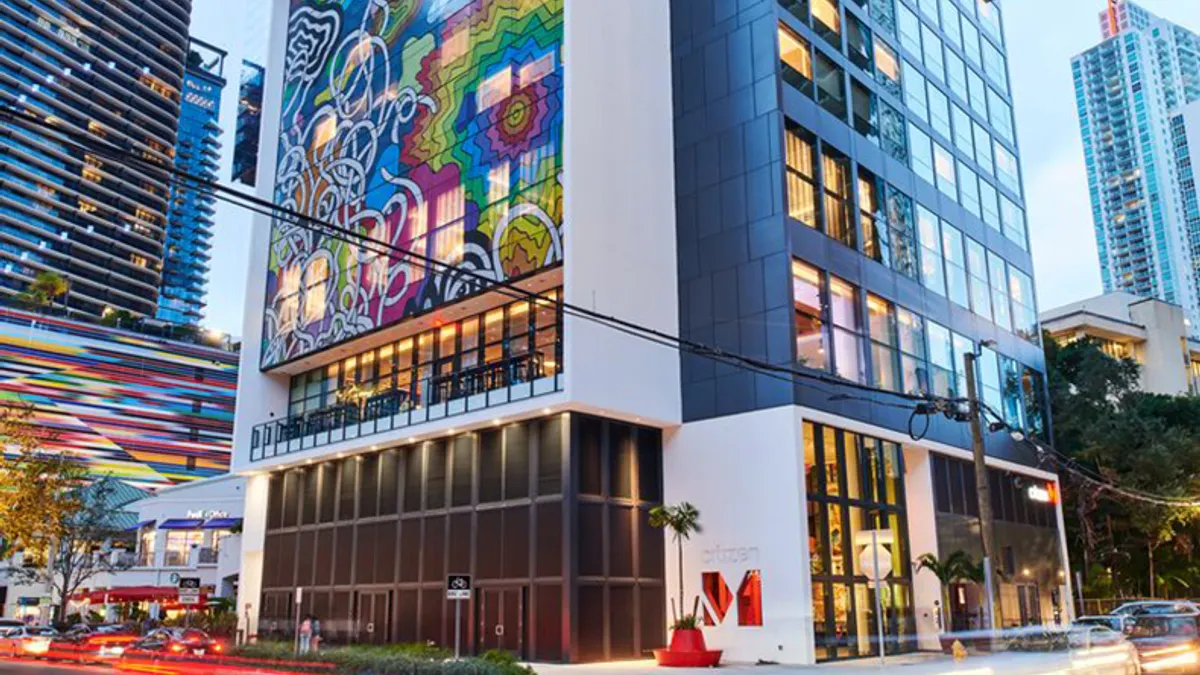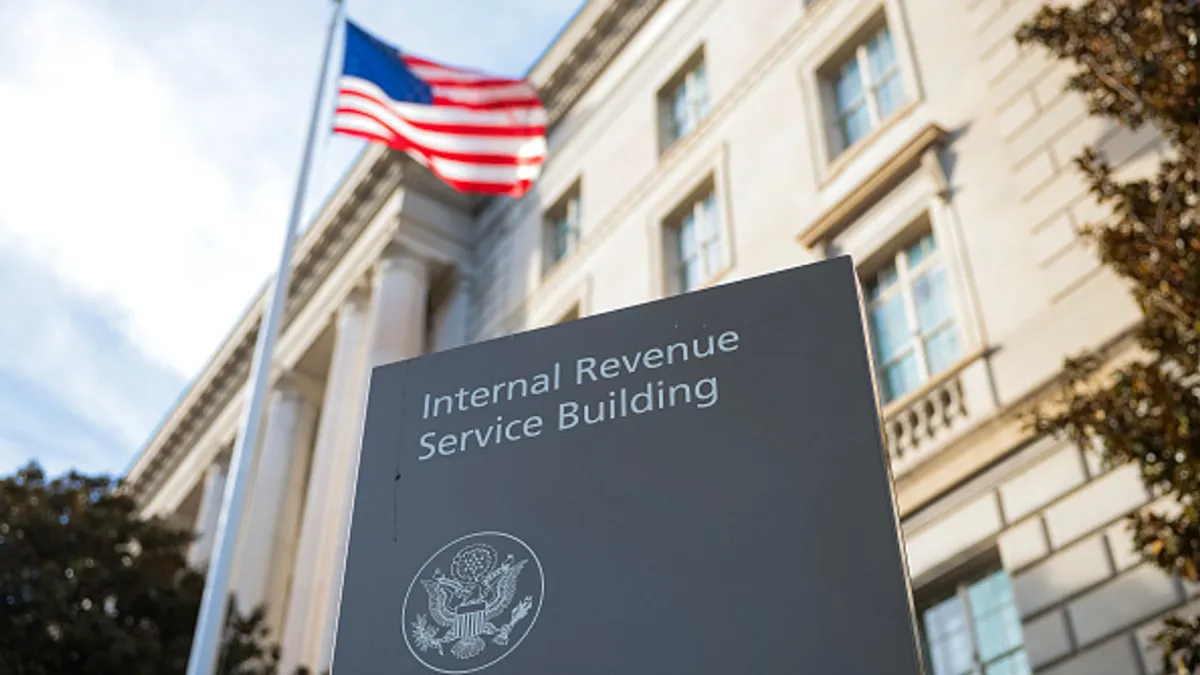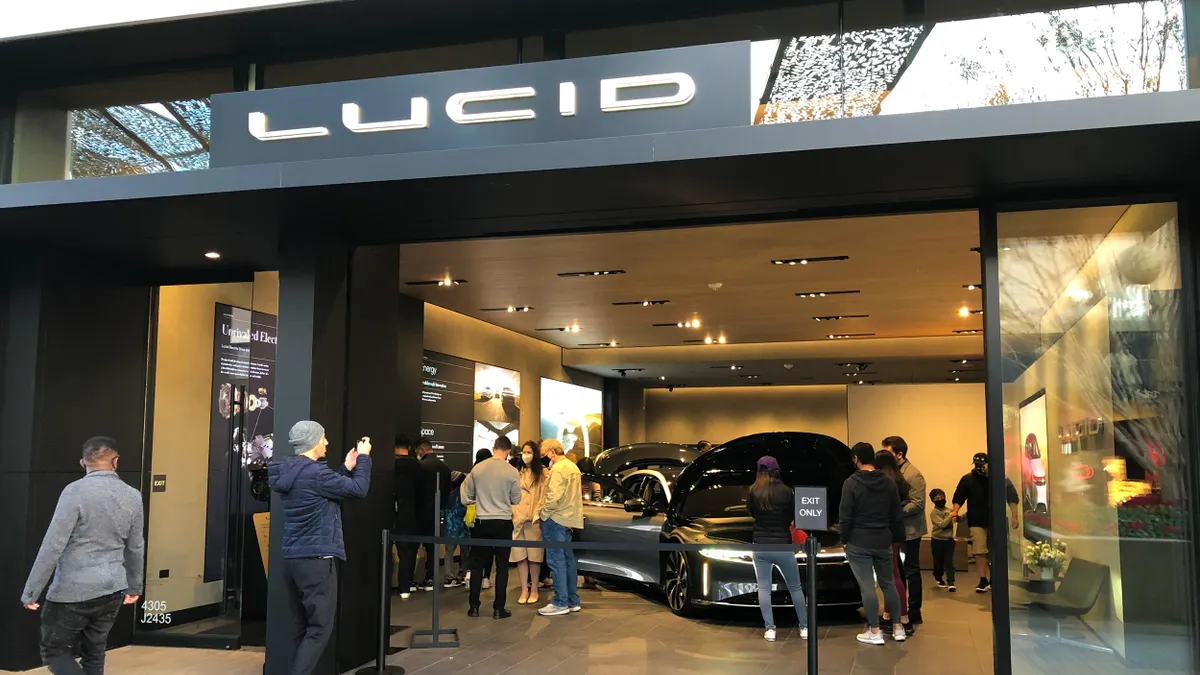The hotel industry was abuzz Monday after Marriott International announced plans to acquire the Netherlands-based CitizenM brand in a $355 million deal set to boost the hotel heavyweight’s portfolio in the competitive lifestyle segment.
The deal is slated to add 36 select-service lifestyle hotels in the U.S., Europe and Asia-Pacific region to Marriott’s portfolio, as well as three under-construction hotels when they open in 2026. CitizenM’s global portfolio spans top urban destinations, including New York, London and Paris.
Through the transaction, expected to close later this year, Marriott will acquire the CitizenM brand and related intellectual property, while CitizenM will continue to own the real estate and operate the hotels, the company announced Monday.
The Marriott-CitizenM deal shines a spotlight on several broader hospitality trends, industry professionals shared with CFO Dive sister publication Hotel Dive. These include a push toward affordable lifestyle offerings, consolidation as a means to gain scale and grow loyalty and the need to cater to the next generation of travelers with uniquely designed, tech-forward accommodations.
Following Marriott’s announcement of the deal, Hotel Dive spoke with industry executives about the appeal — and challenges, including brand cannibalization — of brand consolidation. Marriott CFO Leeny Oberg, meanwhile, gave a glimpse into the strategy behind the play.
‘I thought this was going to go to Hyatt’
The latest in a long line of recent brand consolidations in the lifestyle segment, the Marriott-CitizenM acquisition news didn’t shock industry leaders.
Dan Peek, Americas president for JLL’s Hotels & Hospitality Group, told Hotel Dive that the CitizenM brand has several desirable traits that make it an attractive investment.
Likewise, Philipp Mirow, hospitality consultant and founder of Meridian Thinking as well as a former Choice Hotels International executive, said, “I wouldn’t say it necessarily prompted a huge shock.” However, Marriott as the acquirer did surprise Mirow.
“I thought this was going to go to Hyatt,” Mirow said, adding that the “approachable luxury” offerings that CitizenM prides itself on would have rounded out Hyatt’s portfolio nicely.
“Hyatt continues to be one of the key players to watch, outside of Marriott and Hilton, because it has been investing so heavily in lifestyle,” Mirow said.
In addition to its August acquisition of Standard International, Hyatt Hotels has bought several notable lifestyle brands in years past, including Dream Hotel Group, Mr & Mrs Smith and German brand Me and All Hotels.
However, Marriott has made its fair share of brand deals of late. In December, the hotel company acquired Postcard Cabins and simultaneously executed a deal with Trailborn. Additionally, in August, Marriott entered a long-term agreement with Sonder, a deal that is in the process of finalizing. Hilton and IHG Hotels & Resorts have also recently expanded through brand acquisition.
A hotel company was bound to acquire CitizenM, Mirow noted, as the lifestyle brand had been looking for investment for some time.
The deal, he said, “ties into the continued trend that we’ve seen within the industry around consolidation of key players and the shift and focus on lifestyle.”
This shift has resulted in what Sid Narang, currently a managing principal at private investment firm Crescent Capital Ventures and a former exec at SBE, Starwood and W Hotels, calls the “lifestyle wars:” an ongoing fight between lifestyle brands for customers and the share of their wallet, clients’ money and business, lenders’ capital, talent and other important resources.
“With organic growth drying up, companies are now exploring bolt-on acquisitions to fuel their pipelines, especially in the lifestyle space, which continues to appeal to Gen Z and offers tremendous growth opportunities abroad as well,” Narang told Hotel Dive.
'A smart acquisition'
Marriott’s acquisition of CitizenM will allow it to accelerate global expansion, particularly in markets where Marriott is neck and neck with competition, according to Mirow.
“The European market is one that both Marriott and Hilton have been fighting over to gain ground, so this is a smart acquisition for [Marriott] because it does increase the number of rooms that they have available in those markets,” Mirow said, adding that the European market “is primarily dominated by independent and local players, so neither Marriott nor Hilton have managed to gain as much of a footing as they have in the Americas.”
Assuming the CitizenM deal closes this year, Marriott now expects its full-year 2025 net rooms growth to approach 5%, according to the company.
“Fundamentally, no brand will be successful if [the acquirer] is unable to scale while protecting the soul of what made the brand successful to start with.”

Philipp Mirow
Hospitality Consultant and Founder of Meridian Thinking
The CitizenM deal won’t just expand Marriott’s physical footprint, though. It will also “feed its loyalty program,” Narang said.
In 2024, hotel brand partnerships drove surging loyalty program membership, CBRE reported earlier this month. The Marriott Bonvoy loyalty program currently leads competing programs by member count, with 228 million members, according to Skift.
Despite its leader status, loyalty growth remains a top priority for Marriott. The week prior to the CitizenM acquisition announcement, Marriott Global Development Officer Noah Silverman told Hotel Dive that Marriott Bonvoy gives the company “a real competitive advantage” and fuels its success.
The CitizenM acquisition is likely particularly desirable to Marriott as it looks to build loyalty among Gen Z travelers, JLL’s Peek noted.
“It’s very much about where [Marriott] sees the next generation of travelers being attracted to,” Peek said, explaining that younger travelers want hotels with cool, energetic and approachable public spaces. “CitizenM is part of this constant evolution.”
Mirow echoed that “vibrant communal spaces,” including its rooftop bars, are a draw of CitizenM, saying the brand has been “a source of inspiration” for other lifestyle operators in this realm.
The experience and design that CitizenM offers is something that Marriott hopes to capitalize on, according to Marriott CFO Leeny Oberg. The brand is “one that just really hits the nail on the head, and we’re very excited about adding it to our portfolio,” she told Hotel Dive Monday.
Today’s customer “really appreciates a very tech-savvy experience, but also with terrific design and styling,” she added. According to Oberg, the deal aligns with Marriott’s strategy to offer guests a full range of experiences, price points and locations.
'Will you not be worried about cannibalization?'
Marriott already offers one brand that’s awfully similar to CitizenM, though, and that’s Moxy Hotels. The hotel company now faces the challenge of ensuring Moxy and CitizenM complement, rather than cannibalize, each other, experts shared.
The select-service Moxy brand — launched in Milan in 2014 — spans upward of 135 open properties in more than 25 countries and territories.
“Both of these brands are urban-centric brands that target a younger consumer. They both focus on communal spaces. They both have quite an iconic guest room design that is a much smaller footprint,” Mirow said.
Marriott having more brand options, even if they are similar, may be great for a Bonvoy member, Narang said, but “if you’re an owner or an investor in this brand, will you not be worried about cannibalization of customers?”
There are some distinctions, Mirow noted. CitizenM is “tailored a little bit more to the business traveler, whereas Moxy is this more playful, energetic party brand,” he said.
Oberg echoed the sentiment, saying that while both select-service brands emphasize lifestyle, they have different focuses. “Moxy’s focus is a bit more playful, while CitizenM leans into its tech-savvy experience with a real focus on design and styling,” she said.
To successfully differentiate the two, Marriott will need to preserve CitizenM’s brand identity and integrity, Mirow noted.
“One of the potential downfalls would be that Marriott over-engineers this [CitizenM] brand and removes some of the essential luxuries and quirks of the brand that stand out to its followers and its travelers,” Mirow said. “Fundamentally, no brand will be successful if [the acquirer] is unable to scale while protecting the soul of what made the brand successful to start with.”
This won’t be a problem for Marriott, Oberg explained. “We have a proven track record of being able to acquire brands and then grow them as part of our overall system, but at the same time, preserving what makes them unique and attractive to the guests,” she said.
'Shock-and-awe'
The challenge of brand cannibalization is one that hotel players will continue to face as brand consolidation remains the fastest way for companies to grow scale and hedge against market volatility, according to experts.
“I don’t see a reason for [consolidation] to stop,” Narang said. “As demand softens and as uncertainty continues, that is going to impact growth, and that is going to therefore encourage the larger companies to look at their brands very carefully and [ask], ‘Do we have the brands that will allow us to have pricing power?’ Because, at the end of the day, that’s what this is about, pricing power.”
Peek said that the big brands will continue to look strategically for growth opportunities. “If you’re Marriott or Hilton and you see something of scale that has a nice growth profile that you think fits within your company, I think you’re going to pursue it,” he said.
“With organic growth drying up, companies are now exploring bolt-on acquisitions to fuel their pipelines, especially in the lifestyle space, which continues to appeal to Gen Z and offers tremendous growth opportunities abroad as well.”

Sid Narang
Managing Principal at private investment firm Crescent Capital Ventures
New York-based Ace Hotels or London-based Yotel may be the next to be gobbled up by a bigger hotel player, Narang said, adding that more “shock-and-awe” deals could also be on the horizon.
From a capital perspective, it’s entirely feasible that Marriott, Hilton or Accor could go after a larger brand that is owned by a more nontraditional hotel owner, like Four Seasons Hotels & Resorts or Rosewood Hotels, according to Narang.
“These are brands that are out there. It doesn’t mean they’re all for sale. They are probably not for sale, but they’re highly appealing right now,” Narang said. “Why not those brands? Why not engage with those parties and explore a price that makes sense?”























